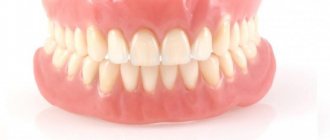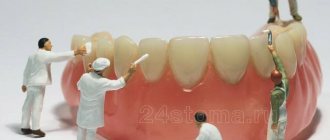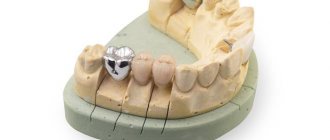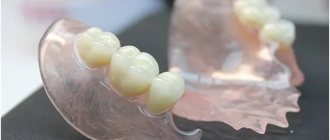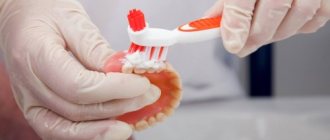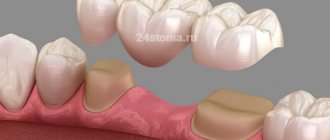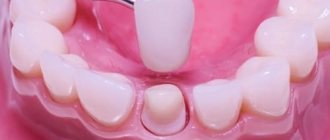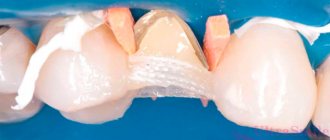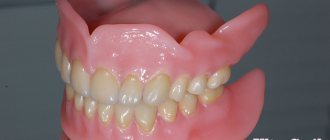Removable dentures are represented by structures that are fixed on the gums not with glue, but with the help of special clasps. Such dentures are made when the patient has lost one tooth unit or, most often, several. Most of the current designs are made from modern acrylic plastic. This material is durable and retains both color and shape for a long time.
Do I need to remove dentures at night?
Why it may be necessary to remove a prosthesis
If we discuss modern prostheses, then it is not at all necessary to take them off every night. Orthopedists recommend removing them if you feel a burning sensation on the mucous membranes or dryness in the oral cavity. It also happens that a rash appears on the body. But these cases are rare and allergic in nature. If it occurs, you need to go to the doctor to eliminate the causes of this pathological situation.
You don't have to take your dentures off every night
Another point why a patient may need to remove dentures at night is his own fears. A certain percentage of people are quite suspicious of their own health and the manipulations that doctors perform with it. Removable dentures are an innovation in their lifestyle, they need to get used to them, realize that they now replace missing teeth. A person may be afraid that the prosthesis will fall out of place in a dream, that it could be injured. Some prosthetic owners even worry that they will be able to swallow a small prosthesis (although this is very problematic).
The orthopedist will explain to the patient how to care for the prosthesis and how to store it.
Of course, a doctor can dispel such fears. If the patient trusts his orthopedist, and he, in turn, explained to the person everything about the use of prostheses, worries will disappear on their own. But if the person himself decides that it is safer for him to remove the prosthesis at night, then he may well do so.
When to install a nylon prosthesis rationally
A nylon prosthesis can restore all missing teeth on the jaw or only part of them - when some are still left.
In the first case, it will be a full nylon denture, in the second - a partial one. A nylon soft prosthesis for several teeth looks schematically like this:
It is held by adjacent teeth with its clasps. Typically, such a defect is easier and more optimal to restore with a bridge, implant or inlays:
But if you don’t want either one or the other, prosthetics with a nylon prosthesis is the way out.
If teeth are missing on one side, Nylon teeth can restore missing teeth on only one side without affecting the other. The only condition is the presence of the last tooth.
If the last tooth is missing, then a single-sided nylon denture will rest only on the front teeth. And hard to fix:
This option is not ideal - there is a high probability of mobility. In such a situation, a one-sided prosthesis with locks would be better. It will provide better fixation.
in the absence of teeth on both sides, but when the last teeth are present, there will be one conventional denture. The left and right sides are connected by plastic or metal behind the front teeth. Which causes great inconvenience for diction and habituation.
Flexible will allow you to make two separate ones. Not connected in any way. The volume will be significantly less. And convenience is better.
on the upper jaw Removable nylon dentures do not completely cover the palate, but only partially. To do this, there must be teeth on both sides of the jaw so that the prosthesis can hold on to them. If there are no teeth on one side, then there will be no reliable retention - you will have to cover the palate completely.
to restore one to five teeth Removable nylon dentures can restore not only a large number of teeth, but also a small number - one or two. They hold on to adjacent teeth. The neighboring side is not involved. The prosthesis is made on one side only. Other materials cannot do this.
with complete absence of teeth, Nylon dental prosthetics greatly helps in situations where there is not a single tooth left on the upper jaw (or one or two), and the lower jaw has retained all the teeth (or they have been restored with bridges or implants). In this case, cracks or breakage of the upper denture is common. To eliminate this, they are reinforced - metal elements, wire, mesh, etc. are laid.
All these types of reinforcement are good in their own way, but lead to thickening of the prosthesis. Which does not have a very good effect on getting used to them and ease of use (those who have removable dentures will understand me). Reinforcement increases not only volume, but also weight. And it does not guarantee the absence of breakdowns in the future.
It is in such a situation that nylon dental prosthetics will come in very handy - it will never break, no matter what the load is on it (meaning chewing load, not playful hands and vandalism). Therefore, if one of the jaws has no teeth at all, and the other is full, then a flexible prosthesis is the right choice:
Having listed all the disadvantages of nylon prostheses, we will still argue that in some cases their use is justified, in others it is not rational. This will be decided by your dentist during your consultation. He will advise what options are possible in your case, how they differ in reliability, time, cost and forecast. Consult and only then decide.
How to store dentures at night
Previous rubber prostheses, which were used before modern acrylic structures, had to be removed every night. And they left them overnight in a regular glass of water. Today, with prosthetics, things are a little different. Only at the initial stage of construction a humid environment is required, no more than one and a half months. Acrylic plastic takes on its best appearance when exposed to air, which is explained by the passage of monomers.
The logic is simple: the human mouth already has a humid environment, which means that dentures can be worn in the mouth, removing them only occasionally. And they need to be stored not in glasses, but in convenient containers. In some cases, dentures may be wrapped in cotton cloth.
Container for dentures
If you are going to take out your dentures before going to bed, you need to follow simple instructions.
- Acrylic dentures
How to properly remove dentures at night:
- the structures are removed and washed thoroughly with boiled water (but not running!);
- The prosthesis can be cleaned with a special liquid with an antiseptic effect, as well as with a brush;
- place the structure in a special solution: this composition destroys bacteria that have accumulated during the day, and also removes the remnants of the fixing cream.
Korega tablets for cleaning dentures
About once a year, dentures should be professionally cleaned at a dental clinic. Immediately after installing the structure, ask the doctor how to properly clean them, where to get the composition and storage container, and how often to come for preventive appointments. The doctor is obliged to provide you with comprehensive information.
Video: Should I take my dentures off at night?
Cost: what it depends on
The price of nylon removable denture systems varies depending on the specific model. With complete edentia, the cost of the structure is 30-50 thousand rubles, when correcting partial edentia, the costs will be in the range of 15-40 thousand rubles, a fixed nylon prosthesis for 1-2 teeth will cost 12-15 thousand rubles.
The exact cost of a removable nylon denture can be found out at a consultation with an orthopedic dentist, who, after a diagnostic examination of the oral cavity, will indicate the exact amount required for prosthetics.
Consequences of insufficient denture care
Dental removable structures require constant care. If you neglect it, you can face a whole list of problems. Therefore, from the very first day of using dentures, you need to follow the rules of care.
Possible consequences of insufficient denture care:
- repulsive odor emanating from dentures;
- carious destruction of native teeth;
- ulcers and erosions on the mucous membrane;
- inflammatory process on the gums;
- change in taste sensations for the worse;
- aesthetic defects of removable structures.
Dentures require mandatory cleaning and care
You should definitely seek help from specialists so that they can return your dentures to their previous appearance with professional cleaning. This will extend the life of the dentures. As a rule, all modern clinics carry out such cleaning.
Cleaning the prosthesis
How to get used to dentures faster
The problem of leaving the denture overnight or removing it usually occurs among those who are not fully accustomed to such teeth. At the same time, the person himself must show some effort; addiction requires the involvement of the owner of the prosthesis in this adaptation period.
How to get used to removable dentures
| Adaptation measures | How often to do | Notes |
| Reading aloud | At least three to four times a day for at least five minutes. | At the same time, you need to read expressively and measuredly so that the articulatory apparatus gets used to the new teeth. |
| Wear the design constantly | The dentures do not need to be removed at all for at least 4-5 days. | This is a mandatory measure - the key to successful addiction. |
| Optimal chewing load | An ordinary apple will help: cut it into pieces, chew gradually. Eat one or two apples a day this way. | Listen to your feelings; if the discomfort is severe, you should go to the doctor. |
| Regular cleaning | You need to clean your denture twice a day, morning and evening. | After every meal, rinse your mouth. |
- Clasp dentures
Although not often, it happens that at first a new design can cause vomiting. There is no need to panic and remove the prosthesis: breathe deeply, drink plenty of fluids. Sucking mints will help relieve the urge.
Methods for cleaning clasp dentures
As mentioned above, one cleaning method is to wash the product with soap and water. This must be done after each meal using boiled or soapy water that does not contain harmful microorganisms. It should be noted that this cleaning method is intermediate, so it must be used in combination with other methods.
Once a day, the prosthesis must be treated in a disinfectant solution, which is prepared from special tablets and plain water. The processing principle is quite simple: the product is placed in the prepared solution and, after 5-10 minutes of soaking, is removed. This time is enough to remove barely noticeable food debris and bacterial plaque from the surface of the walls.
Experts also recommend treating the denture once a week in a special bio-solution, which can remove old stains and stubborn food residues. After the procedure, the product must be rinsed with clean water.
Stuck food particles and bacterial plaque can also be removed using a toothbrush and dental floss. Cleaning can be done with either regular or specialized toothpaste. Upon completion, the prosthesis is washed with clean water.
How common is denture intolerance?
There is a small percentage of patients who still cannot get used to removable structures. If the person himself follows all the instructions for successful adaptation, but the discomfort does not go away, this indicates intolerance to the prostheses. Usually, in this case, the prosthesis gets in the way, is perceived as a hindrance in the mouth, rubs the gums, spoils pronunciation, and makes it impossible to eat without feeling uncomfortable.
Sometimes intolerance to dentures occurs
Oddly enough, the dentist is a bad helper in such a situation. In most such cases, we are talking about psychological intolerance. Some internal attitudes prevent a person from accepting a prosthesis. It is logical to assume that you need to see a psychologist. This practice exists, and it is quite successful.
How to reduce pain symptoms when wearing a prosthesis
At first, a person may feel some pain while chewing. This is explained by the unusual load; over time, such sensations should go away. The gums, a certain area of which was without teeth for some time, “forgot” this condition with a full row of teeth, so it can be uncomfortable. Some patients say that they feel as if the denture is pressing on their gums.
Some patients claim that the denture puts pressure on the gums
To remove these negative feelings, give up solid food for the first month - food should be as soft and comfortable as possible. Solid foods are allowed only as you get used to the dentures.
You will have to give up solid food for a while
It is necessary to monitor the condition of the mucous membrane: any damage, even the slightest, should be prevented. They are fraught with an inflammatory process that will interfere with the use of prostheses. Prolonged pain during the use of prostheses is explained by only two reasons: hypersensitivity of the patient’s mucous membrane or an incorrectly made prosthesis, the size of which did not suit the patient.
It is important to observe the mucous membrane, noting the appearance of discomfort, pain
To ease the condition of your gums in the first days of adaptation, you can do self-massage. Using fingers treated with an antiseptic, you need to stroke the gum itself in a circular motion. There is only one movement - from the healthy gum area to the inflamed side. When the stroking becomes as comfortable as possible, the pressure can be increased.
Gum massage
Adaptation to prostheses is the work of the patient, his own efforts. Follow all instructions, do not remove the prosthesis too often, remember that you can sleep in it without any precautions. Read about rinsing after tooth extraction for gum healing on our website.
